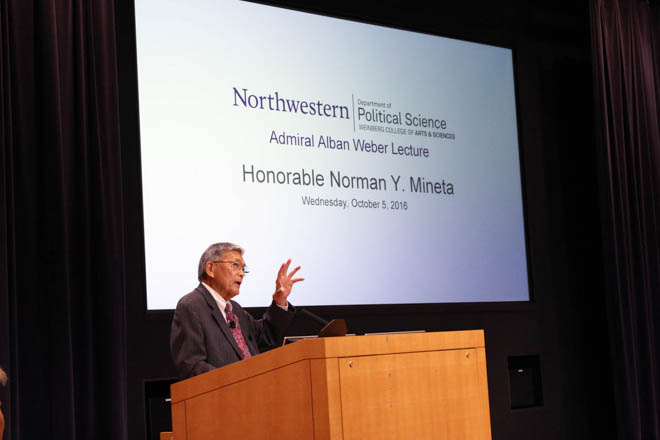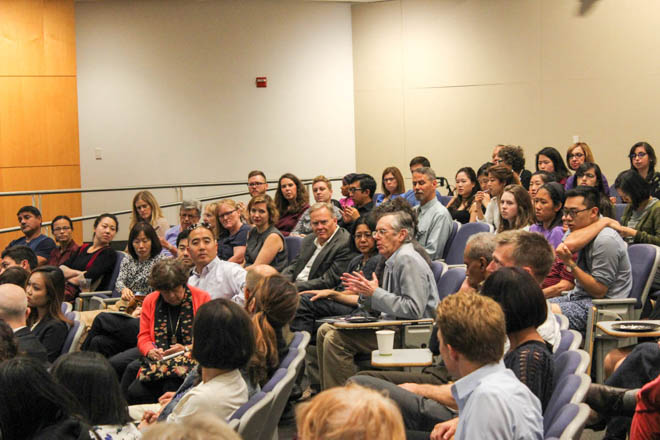On Wednesday, the Honorable Norman Y. Mineta visited Northwestern to discuss national security and civil rights. Mineta has been a landmark figure in the fields of Asian-American civil rights and transportation throughout his nearly 50-year-long political career; he most notably served as the first Asian American presidential cabinet member under both a Republican and Democratic president. He also contributed to numerous civil rights bills, including the Civil Liberties Act of 1988, which redressed the descrimination that Japanese-Americans experienced during World War II.
During his presentation, Mineta first discussed his childhood at a Japanese internment camp during World War II, then connected that to his experience as Secretary of Transportation on 9/11. After the Twin Towers were hit, some government officials discussed rounding up all Muslims and putting them in camps – the same way the U.S. did with Japanese-Americans during Mineta’s childhood – but President George Bush insisted he didn’t want what happened to Mineta to happen again.
“I really enjoyed his story about the time when he was interning and how that correlated with his work in the White House,” McCormick sophomore Shannon Kollasch said. “Now that there’s so much anti-Muslim sentiment, it’s really interesting to hear about the Japanese during World War II. I had just read about two weeks ago an article that had the same quote, the one from Bush when he said ‘We don’t to have happened today what happened to Norm in 1942,’ so that was really interesting.”
Mineta’s lecture was part of the Admiral Weber Lecture Series that Northwestern hosts every year, which typically features a distinguished speaker from the fields of public service, academia or the arts. Political science chair Sara Monoson said that this year the department invited Mineta after learning he would be in Chicago doing work for a Los Angeles museum, hoping he could speak about his long history in politics and civil rights.
“We worked to put together an event for the students and the community, because we knew there would be a lot of interest,” Monoson said. “[Mineta] is a very generous, public person. He cares about interacting with people and bringing some of the details that he’s privy to to light so people can appreciate some of these complexities that aren’t always easy to see.”
Throughout his lecture, Mineta spoke openly about how Japanese internment affected his family. As a child, he was first held in his home state of California, then was transferred to Wyoming before ending up in Evanston for a brief period (during which time he actually attended Haven Middle School 10 minutes away from Northwestern). After attending University of California, Berkeley, he spent a few years with his father in the life insurance business before breaking into politics by becoming the mayor of San Jose. Since then, he’s served in the House of Representatives and become the longest-serving Secretary of Transportation, serving under both President Bill Clinton and President George W. Bush.
“Just to think about someone who was the transportation secretary on 9/11 and had a long career in the Congress is so interesting for so many people,” Monoson said. “The turnout was great. There were people from the community, undergraduates, faculty, staff, just visitors; I thought it was a great opportunity for a lot of different constituencies to come together for one event.”
In addition to Wednesday’s lecture, Mineta led a discussion on Tuesday entitled “The Relevance of the Japanese American National Museum to the Chicago Nikkei community,” along with a sit-in for an Asian-American studies class. For students who enjoyed this year’s Weber lecture, the political science department is currently brainstorming who to host next year and welcomes student suggestions.

